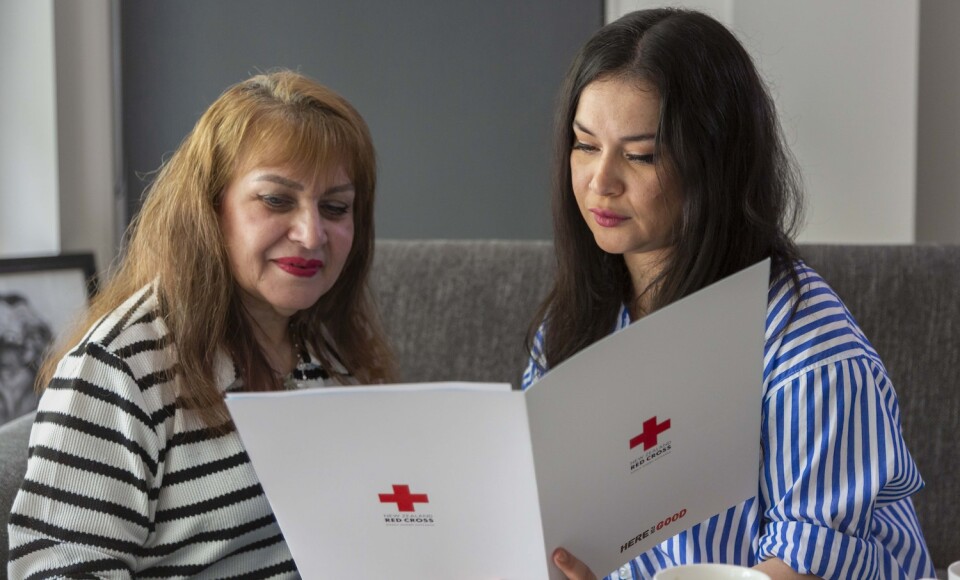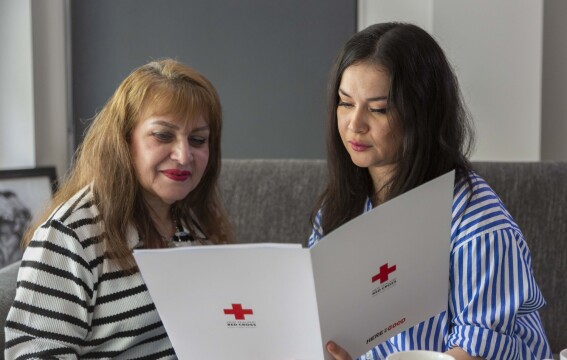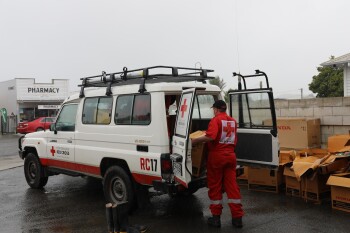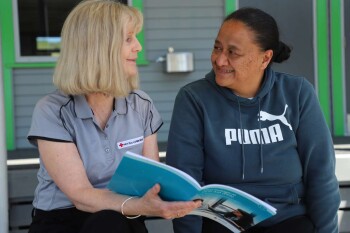A year on: Full $28.5 million committed to community disaster relief
9 February 2024


Update 15: New Zealand Disaster Fund
A year after Cyclone Gabrielle and other severe weather events in early 2023 we’ve committed the entire New Zealand Disaster Fund to helping people and communities affected. We acknowledge that for many, recovery is continuing. The Home Bundles and Resilience and Investment programmes are continuing to help people get back on their feet and prepare for the next event.
On this page:
- Committing the entire New Zealand Disaster Fund
- How Home Bundles are helping
- Helping communities be better prepared
- Taking care of wellbeing
- By the numbers
Committing the entire New Zealand Disaster Fund
The entire New Zealand Disaster Fund, including interest earned – a total of $28.5 million – has now been committed to programmes supporting whānau, families and communities to recover, and to prepare for the next emergency.
- $1 million was spent during the early emergency response.
- $15 million has been distributed in grants to community organisations.
- $6 million has been committed to support households through our Home Bundles programme.
- $6.5 million has been committed to building community resilience.
New Zealand Red Cross Secretary General, Sarah Stuart-Black said the work over the past year has not always been easy, or straightforward.
“We focused on finding the gaps, the most vulnerable, and then working with the community organisations, iwi, hapu and local councils best placed to meet their needs. Along the way, we listened and adapted our plans to ensure funds were spent where and when they would do the most good."
Recovery is still top of mind for many communities. Our Home Bundles Programme, and Resilience Programme, are continuing to support those most impacted and equip communities better for future emergencies.
New Zealand Red Cross is grateful to all those people and organisations who contributed to the New Zealand Disaster Fund. Through your generous donations, we have been able to help those impacted in a huge range of ways.
How Home Bundles are helping

As we listened to communities, we could see that people were struggling to replace all that they had lost. So the Home Bundles programme was created to support people to move back into their homes and rebuild their lives – by helping them to replace essential items such as whiteware, beds and bedding, living room furniture, heaters and essential kitchenware.
Over the last few months, about 263 Bundles (over 5,000 items) have been delivered to households across Tāmaki Makaurau | Auckland, Tairāwhiti and Hawke’s Bay, replacing essential belongings for those most impacted by the severe weather events and Cyclone Gabrielle. Another 95 Bundles have already been ordered and will be delivered in the coming months as people move into permanent housing.
More bundles will be ordered in the months to come, as Sean Stewart, Red Cross General Manager Emergency Management and International, explains. “We expect the programme will help more than 2,000 people to replace furniture and other basic household items damaged in the floods and cyclone. We continue to work with our community partners to make sure that those in need receive their household goods when they are ready for them.”
There are four criteria households needed to meet to be eligible for a Home Bundle – they are for people who:
- live in an area affected by the severe weather in January and February, 2023
- suffered significant loss or damage to their home contents
- have not already replaced their furniture
- have limited or no means to replace lost items.

Home Bundles recipients Hend Selim and Laila Abd El Gawad chat
We also take other factors into account such as health and family situations.
Home Bundle recipients, Hend Selim and Laila Abd El Gawad, tell us the best part of receiving a Home Bundle, was that it “helped Mum to go to sleep and rest”. Now the family are settled in a stable environment and have the essentials to enjoy a cup of tea, and a healthy bed to sleep in. They are able to rest and recover thanks to the generosity of Kiwis who donated to the New Zealand Disaster Fund.
Read the full story: How Home Bundles help
Helping communities be better prepared
Our Resilience Investment Programme is helping make sure communities will be better supported and prepared for future emergencies as the impacts of climate change grow. We are funding community resilience in four areas – shelter, power, communications and welfare support.
A total of $6.5 million has now been committed in grants for disaster preparedness in affected communities:
- Shelter includes things like stretchers, bedding and first aid kits.
- Power includes things like generators, battery banks and solar panels.
- Communications includes things like satellite connections and emergency radios.
- Welfare support includes things like first aid and Psychological First Aid training.
Sarah Stuart-Black said, “what we heard over the last few months is that communities want and need to be better prepared for the next event. So we’ve been working with communities and emergency management staff in local councils to allocate resilience funding in areas where we can complement the work of other agencies and community groups.

“For example, we’ve been working with Hastings District Council to understand what they learned from the cyclone. They know that a number of their communities want to be more prepared for the next event and they have been working with those communities to identify the support they need. So, we’re providing funding for part of that ‘community emergency hub’ initiative, towards things like generators, communications equipment, hygiene and safety equipment. This will benefit a further 15 local communities around the Hastings District.”
One of these communities is Pakowhai, where a grant is supporting Hastings District Council to make upgrades to the Pakowhai War Memorial Hall that was damaged in the cyclone. This includes upgrades to communications equipment, new publicly accessible AEDs, first aid equipment and resilient power sources. This will ensure the hall can be used as a hub during emergencies, providing better resilience for the community in future events.
Stuart-Black adds, “every event is a chance to learn and there are always things to improve. The lessons we identified over the last year are already shaping our responses to future events – for example, looking at increasing the numbers of Red Cross people ready and able to respond in Auckland so we can do more in the next event.”
Resilience activities are being funded across affected communities. We’re working with communities who are still recovering, at the pace that works best for them, so delivery of this programme will continue for the next several months.
Taking care of wellbeing
The one-year anniversary of these events will bring different emotions for different people – all of which are to be expected. Providing psychological support to those affected by these events has been a key part of our role, through the initial emergency response and over the months that followed.
Over the past year, more than 1,000 people attended one of our Psychological First Aid Courses – learning how to support themselves and others.
 We have also supported programmes offered by others in impacted areas, through our Partnership Grants Programme. In Wairoa, a grant from the Disaster Fund allowed Nigel Latta to provide services to the local community – something he says has been a huge privilege.
We have also supported programmes offered by others in impacted areas, through our Partnership Grants Programme. In Wairoa, a grant from the Disaster Fund allowed Nigel Latta to provide services to the local community – something he says has been a huge privilege.
“One of the most important things people from Wairoa said is that they didn’t just need a one-off event, they needed sustained support over a longer timeframe. The New Zealand Disaster Fund has made it possible for us to do that.”
Sarah Stuart-Black adds: “it is important for people to be able to take practical steps to look after themselves, to give support or to receive it. Anniversaries can be especially hard, so helping local organisations to continue to offer support to communities over this time, through grants from the Fund, is an especially valuable part of our ongoing resilience work."
While courses funded by the New Zealand Disaster Fund have ended, we continue to offer similar courses regularly to communities throughout Aotearoa New Zealand.
- Caring for yourself and others
- Looking after mental health in recovering communities
- Book a Psychological First Aid course in your area
By the numbers
The New Zealand Disaster Fund is being allocated across three programmes of work:
- The Response and Recovery Programme supported our immediate emergency response on the ground and helped communities in early recovery by providing goods, services, and people.
- $7 million has been committed in this Programme, including approximately $6 million for Home Bundles.
- The Partnership Grants Programme provided grants to community organisations supporting community response and recovery.
- $15 million has been committed in this Programme.
- The Resilience Investment Programme is focused on helping ensure communities are better prepared and supported in the event of another disaster.
- $6.5 million has been committed in this Programme.
Total committed funds across all programmes: $28.5 million
Total donations: $27.8 million
Interest earned and added to the Fund: $748,000
Partnership Grants Programme
This programme distributed grants to community organisations helping those affected. Supporting these organisations helps make sure response and recovery work is community-led and meets local needs.
Total approximate spent or committed: $15 million
Number of grants made: 166
See the full list of entities we have supported
Response and Recovery Programme
This programme supported our immediate emergency response on the ground and is helping communities recover by providing goods, services, and people. It is now focused on rolling out Red Cross Home Bundles.
Total approximate spent or committed: $7 million
Red Cross Home Bundles programme: Supplying new basic furnishings and household items to eligible households in need identified by our delivery partners. The programme is underway in Tāmaki Makaurau Auckland, Hawke’s Bay and Tairāwhiti. Many households are still working through returning to their homes or finding suitable accommodation, so we’re timing orders and deliveries to suit what people need.
Bundles delivered: 263
Bundles orders being processed: 95
Total capacity for Bundles: 500+
Red Cross response: Supporting Disaster Welfare and Support Team travel and equipment to support local Civil Defence Emergency Management Group requirements. Providing psychosocial training to 1,001 people participating in 81 courses.
Equipment: Includes generators, dehumidifiers, clean-up kits, first aid kits and other items relating to emergency accommodation and other community needs.
See a breakdown of our spending under the Response and Recovery programme to date
Resilience Investment Programme
This programme provides funding to help communities prepare for, respond to, and recover from future emergencies and disasters as the impacts of climate change grow.
Total approximate spent or committed: $6.5 million
Number of grants made: 37
This will be the final update published in the hub relating to the New Zealand Disaster Fund.
Figures provided are as accurate as possible as at 7 February 2024. Figures may change slightly as programmes are delivered, given we take a flexible approach enabling us to respond to the needs of communities and partners.
Learn more
We’ve been around for more than 100 years. As the impacts of climate change increase the frequency and severity of weather-related emergencies across the country, we're committed to continuing our essential work.
The New Zealand Disaster Fund helps us to support communities to respond to, recover from, and prepare for disasters and emergencies in Aotearoa New Zealand.
Practical support and information to help you care for yourself and others after the flooding and Cyclone Gabrielle in 2023.
Caring for yourself and others after an emergency or disaster
Volunteer with us
We can’t do our work without the thousands of Kiwis from all corners of Aotearoa New Zealand who give their time and energy to volunteer.
We’re always on the lookout for dedicated people to join us in our humanitarian work. Join over 8,000 other humanitarians in New Zealand and volunteer today.
Find a volunteer role near you
Red Cross in your community
New Zealand Red Cross is part of your community. We have 16 offices around New Zealand. You can join your local branch, group in over 40 cities and towns around New Zealand, or shop at one of our 50 retail stores.
New Zealand Red Cross has seven ‘areas’ across the country. Each area has its own area council, which is elected by the local Red Cross members.
There are nearly 50 branches of New Zealand Red Cross around the country. Branches have a hands-on local-community focus, and are run by volunteers.
Find out more about what we do in New Zealand
Support our work
Our emergency management work is funded through the generosity of donors. The New Zealand Disaster Fund is closed to new donations. A huge thank you to everyone who gave so generously to the Fund. People can still support our ongoing emergency management work across Aotearoa New Zealand by donating to our Where the Need is Greatest fund.
Related stories
- How Home Bundles help
- Recognising exceptional service in Cyclone Gabrielle
- Looking after mental health in recovering communities
- Recovering peace of mind
- Helping those still cleaning up
- Staying with communities through long-term recovery
- Giving hope in cyclone-torn Hawke’s Bay communities
- Six months on: Red Cross commits $20 million in disaster relief
Header image: Our Home Bundles recipients, Hend Selim and Laila Abd El Gawad, invite Red Cross into their temporary accommodation to talk about how their Home Bundles essentials package helped them get back on their feet.
